- Home
- Lynne Reid Banks
The Fairy Rebel Page 5
The Fairy Rebel Read online
Page 5
“It’s her fairy part,” whispered Jan. “Should we do anything … dye it perhaps?”
“We could,” said Charlie doubtfully, “when she gets a bit older. I don’t think dye is very good for babies’ hair.”
But in the end they didn’t bother. As Bindi’s hair grew, the blue hairs were easily hidden in the rest of it, and as soon as it was long enough, they made a little ponytail with the blue hairs buried in the middle. But that all came much later.
Jan half expected Tiki to turn up and look at the baby—after all, she was Bindi’s fairy-mother. But she didn’t. Jan might have been worried, as she had been, months ago, after the business with the wasps. But she had had a message from Tiki and Wijic that put her mind at rest, more or less.
The message had come while it was still winter, although the snow had thawed. One morning while Jan was cleaning a window, a robin had landed on the sill. It had something in its beak. It cocked its head at Jan to make sure she was watching, and then dropped whatever it was and flew away.
Jan had picked it up quickly. It was a tiny pink egg. When she touched it to her tongue, she knew at once it came from Tiki, because it was made of sugar. She cracked it open carefully between her front teeth. It was hollow. Out of it fell a little slip of pinkish-brown paper, only it wasn’t paper—it was a dried rose petal.
It had some writing on it, but so fine it was impossible to read. Jan ran to fetch Charlie’s big magnifying glass from his desk. This is what she read:
So, as the first months of Bindi’s life went by (and of course they were very busy and full months for Jan), she didn’t think much about Tiki, and little by little she almost forgot about her. Or she would have done, but for two things. One was the tuft of blue mixed in with Bindi’s brown hair.
The other was the rose—the one Charlie had picked on Bindi’s birthday. It was still on Jan’s bedside table. And there it stayed. And stayed. And stayed. Another winter came, and another spring, and the roses were nearly ready to bloom again in the garden. And that rose was still sitting there, as fresh and scented and beautiful as the day Charlie had first picked it.
And then it was time for Bindi’s first birthday.
Charlie, who was quite a good cook, baked a cake for her, with some rather lumpy pink icing. Jan wrote BINDI on it in silver balls and put a candle in a pink holder in the middle. They invited friends and relations to the party, and at the last moment Jan went upstairs to “put her face on,” as she called making up. When she came down again she was holding a small vase in her hand.
“Look, Charlie,” she said. “It’s wilted, finally.”
The bedside rose was drooping its head. As she spoke, a shower of petals fell off.
“Never mind,” said Charlie. “Time to pick a fresh one.” And he went out into the garden.
He came in looking puzzled and excited.
“What is it, Charlie?” asked Jan.
“You’re not going to believe this,” said Charlie, and held out a rose. At least it looked just like one. But as soon as Jan touched it, she felt at once that it wasn’t a rose at all. The stem had no thorns on it—it was smooth, and the petals were stiff.
When they leaned over Bindi’s cot and put it into her hand, she gurgled with pleasure and shook it, and it made exactly the sort of noises babies like best, a mixture of clicks and tonkles and pings and rattles, like all the musical instruments played in school—tambourines, triangles, drums and woodblocks—all in one.
Jan and Charlie looked at each other across Bindi’s cot.
“Of course it’s from Tiki,” said Jan. “It’s her birthday present to Bindi.”
“So she’s back,” said Charlie.
“Why doesn’t she show herself?”
“She’s probably still having to lie low so as not to let the Queen notice her,” said Charlie.
That evening, after the party, Jan went out and put a thank-you present under the pear tree. It was a little silver slipper she had taken off her own charm bracelet, with the smallest pink flower that she could find in it, and the cap-cup full of maple syrup. She picked a pink rose petal and laid it on the grass like a tablecloth and put the presents on it.
Then she stood for a while. She didn’t dare call Tiki in case one of the Queen’s spies should hear her. Twilight came over the garden. Just when the last light was fading, Jan thought she felt the flutter of furry wings against her cheek and quickly turned to look—but there was nothing there. She sighed and went back indoors.
Next morning, though, the maple syrup had been drunk, and the silver slipper had gone.
2
Rose-Presents
Bindi grew.
On her second birthday, there was a rose with a hollow stem. When Charlie blew up the stem, all the petals filled with air and opened, and soon the rose didn’t look anything like a rose—it looked like a balloon, a pink balloon with a funny, surprised face on it.
But it was warmer and softer than a real balloon, and what’s more, it didn’t burst. It bobbed about on its stem beside Bindi’s bed and baby carriage for a whole year, and she played with it and loved it. On her third birthday, it shriveled up.
But there was another rose that year. This one came to pieces. All the petals, which were hard, came out and could be fitted back together again. By the time Bindi was four, she had learnt a lot from that rose. On the eve of her fourth birthday, the puzzle-rose got lost.
But Bindi didn’t notice. Because next day, beside her birthday cake, was a new rose with a very long stem. This one had thorns, but they weren’t sharp. Bindi soon found out that if you wiggled one, the rose would tell you a story. The stories lasted, at the rate of a new one every week, for a whole year.
On Bindi’s fifth birthday, the rose was made of some kind of sweet stuff. Bindi, like her mother, loved sweet things, and this rose didn’t last a year—it didn’t last a day. Every delicious petal was eaten before bedtime on her birthday. Each petal tasted different, and none tasted quite like any kind of candy Bindi had tasted before. The magic thing was that next day the rose was whole again, with a new lot of petals.… Bindi (and Jan) would have grown very fat indeed that year if Charlie hadn’t been firm. He put the candy away and only brought it out on special occasions.
Bindi’s sixth rose had letters painted on every petal. The petals came apart and she could make words with the letters. If she spelled a word wrong, the petal with the right letter on it would jump into the right place. Bindi learned to spell simple words that year, which got her off to a good start in school.
Just before her seventh birthday she was given a part in a school play. She was to play a queen. Bindi wasn’t pleased. Though she was ashamed to say so, she felt she’d rather die than get up on a stage and act.
But then, on her birthday, the rose came. This time it was a big, billowy rose, and when she touched it, she realized that its petals were made of fine, fine silk. She tugged one, and it drew out and unfolded, and so did all the other petals, until Bindi was surrounded by masses of pale pink silk. Then Jan found a green edge and picked it up and shook all the silk out, and there was the most beautiful pink and green dress—absolutely perfect for the part of the queen.
And the moment Bindi tried it on, and felt the soft, scented silk against her skin, and saw how grown-up and proud she looked in the mirror, the oddest thing happened. All her shyness left her. She felt like a queen. She suddenly couldn’t wait to stand up on that stage at school and show them all just how much of a queen she could be.
And she did. She remembered all her lines. And she moved and acted and spoke just like a queen. All the teachers and parents and other children clapped wildly, and Jan and Charlie felt so proud, all they could do was hug each other.
After that, Bindi stopped being shy and began to love acting. The pink dress went into the dressing-up cupboard and Bindi wore it for dressing up for a whole year. Then it fell into holes.
By now Bindi had begun to look forward to the special rose-present she
always got on her birthday. On the eve of her eighth birthday, she and Jan and Charlie tried to guess what sort of wonderful present Tiki would send her this year.
Of course, Jan had told her about Tiki, and Wijic, and the magic beginning to Bindi’s life. It was their family secret. Even as a very little girl, Bindi knew that she mustn’t boast about it or tell anyone at all, though she often longed to. But she always managed to keep quiet, because Jan had told her that if she talked about them, the fairies might get into trouble.
The only thing they didn’t tell her about was the wasps. They didn’t want to frighten her. The odd thing was, it didn’t help—she was terrified of wasps anyway.
On the morning of her eighth birthday, the first thing Bindi did was to run down into the garden and hunt about among all the pink roses for the special one that would be her present. She couldn’t find it. She touched and smelled every single rose, but they were all quite ordinary. She came back into the house very sadly.
“Mummy, there’s no rose-present this year,” she said.
“I’ll bet there is. Tiki’s hidden it, or else you’re not looking properly.”
“Well, you come and look,” said Bindi.
So Jan went down into the garden with her and they both had a good look, but they couldn’t find any magic rose. Charlie looked too.
“Oh well,” said Charlie, “it couldn’t go on forever. Maybe they think you’re getting too grown-up for magic.”
“But I’m not! I’m not!” cried Bindi, and ran back into the house.
“I hope this doesn’t spoil her birthday,” said Jan.
“I hope she’s not getting a bit spoilt altogether,” said Charlie. “She must learn to cope with an occasional disappointment.” But he was rather disappointed himself, and so was Jan. At the same time, they were a little bit relieved. They didn’t really want Bindi to be a fairy child. They wanted her to be quite normal and ordinary.
So they did everything they could to make it a nice birthday for her, in a normal and ordinary way. And Bindi enjoyed herself, although she was rather more quiet than usual. In the evening, after her party, when it was nearly bedtime, she went off by herself into the garden.
“She’s gone to have a last look,” said Jan.
“Hm,” said Charlie. He was watching Bindi out of the window. “Yes. She’s going from one rosebush to another. Poor little love, it is rather sad for her.… Hey, wait a minute! She’s stopped.”
Jan came hobbling over to look.
“But that’s not a rosebush,” she said. “That’s that old holly bush that never grows any berries. She won’t find a rose on that.”
“But she has,” said Charlie in a strange voice.
Bindi had had her back turned to the house, and she was bending down. Now she straightened, and turned. In her hand was a rose. But it wasn’t like any of the others.
Jan and Charlie hurried out to meet her. She walked up the path to them.
“I’ve found it,” she said, but there was no joy in her voice. “Look.”
She held it out to them, and they stood there, the three of them, staring at it.
It was the saddest-looking rose you ever saw. It wasn’t pink. It was nearly black. And it wasn’t in full flower, like every other rose in the garden. It was only a bud. And it would never open, because it was dying. Its head was hanging limp on its withered stem. Only the thorns looked healthy.
“That can’t be it,” said Charlie at last. His mouth was dry and his voice was hoarse.
“It must be,” said Bindi. She was whispering, for some reason. “It was growing out of the holly bush. That proves it’s magic. But what’s the matter with it?”
Jan took it gently in her hand and touched the poor dried-up bud. As she did, the black, unfinished petals dropped away, leaving something like a green star with a yellow center. Something flashed from this yellow part, and Jan, with a little cry, dropped the thorny twig on the path.
“It moved,” she whispered. “It twisted in my hand. It—it seemed to burn me for a second, too.”
Bindi was reaching down.
“Don’t touch it!” ordered Charlie suddenly, catching her hand. “Leave it. It’s not your birthday rose; it can’t be. Come inside. It’s time you were in bed.” And he took Bindi’s hand in his and walked quickly with her into the house.
3
The Dried-up Twig
After they’d tucked Bindi into bed, Jan and Charlie sat up late. At first they just sat looking at each other.
Finally Jan said, “Something terrible’s happened.”
And Charlie said, “It’s none of our business.”
Jan felt as if she were married to a stranger.
“How can you possibly say that?”
Charlie turned his face away, and after a few moments he said, in a muffled voice, “I didn’t quite mean that.”
“I should hope not,” said Jan. “Of course it’s our business.”
“I meant,” said Charlie, “that there’s nothing we can do. So it doesn’t help to worry.”
“I’m not so sure about that,” said Jan.
Just then the phone rang. It was a patient of Charlie’s who said he felt very ill, and could Charlie come? Usually Charlie was fairly cheerful about visiting people at night, but tonight he didn’t want to. It was as if he was afraid to leave Jan and Bindi alone in the house.
“Oh, go on, don’t be silly!” said Jan. “We’ll be all right.”
So Charlie went off. And Jan sat for a bit, thinking and worrying. She kept remembering that strange feeling in her hand when she held the dying rosebud. She thought of the twig lying on the path. And then she thought of something else.
Every year, on the night of Bindi’s birthday, Jan had gone out into the garden and left Tiki a thank-you present. There were only two charms left on her charm bracelet. One was a little woven silver basket. And one was a tiny silver rose.
She took the silver rose off the chain, found the old glue-cap that had been Tiki’s cup, filled it with honey and crept out into the dark garden. She tiptoed across the lawn to the pear tree, keeping well away from the path. The roses on the bushes seemed to glow in the dark. She picked a petal, laid it on the grass and put her presents on it. She was trying hard to make everything seem as it always had in the past.
But as she turned to go back into the house, she caught sight of something that froze her in her tracks. On the path was a weird glowing light. It came and went, never quite going out, like something breathing, alive.
She wanted to run, but she felt she ought not to leave it lying there, any more than you would leave a sharp knife or a bottle of poison lying about. Suddenly she knew that everything was not as usual. That thing which had stung or burnt her and twisted like something wickedly alive in her hand was deadly dangerous.
Slowly she moved toward it. When she got close, she could see it by its own light. The dead petals lay scattered near it, and the heart of the star beat like a pulse in the darkness.
Jan felt terrified of it. She tried to reach out her hand, but as she did, the pulsing light grew stronger, the beat quicker, like a warning signal. Her hand drew back by itself. Her feet began to run before she’d told them to. She found herself back in the house, leaning against the locked back door, panting and gasping.
When Charlie came home, he found her still pale and shaky.
“Charlie, that—that thing Bindi found. We must get rid of it. It’s—alive. It’s awful.”
Charlie saw that she had had a fright.
“I’ll see to it in the morning,” he said. “Come on. Bed for you.” She didn’t feel strong enough to argue.
Next morning, Bindi woke up very early. She’d had bad dreams all night, and now she had that flat, letdown feeling you often get on the day after your birthday when all the excitement is over. She had it specially badly this year, because it seemed her fairy had forgotten her.
Then she remembered that there had been a rose-present, even though not a v
ery nice one. She lay in bed thinking how oddly her parents had behaved about that poor, withered rose she’d found growing on the holly bush. They shouldn’t have thrown it away. Perhaps it was just one of Tiki’s tricks, and if only they’d brought it into the house it would have turned into a magic toy, like the others.
At this thought, Bindi jumped out of bed, put on her slippers and ran into the garden. In the middle of the path, she stopped.
The strange, thorny twig was gone.
Only the dried-up petals still lay scattered on the path. If they hadn’t been there, Bindi might have thought she’d dreamt the whole thing.
She turned toward the pear tree. Every year until now, the thank-you presents had gone. This year they were still there. The silver charm rose winked in the grass. Bindi bent to pick it up—and then jumped back.
A big stripy wasp was crouched on the rim of the cap, sucking up the honey.
Bindi stared at the wasp. Somehow it reminded her of a fat tiger, drinking at a jungle pool after it has eaten a big meal.
She felt suddenly sick. And furious. Without stopping to think, she snatched off her slipper and hit at the wasp with it.
“Go away, you hateful thing!” she shouted. “Don’t you drink Tiki’s honey!”
The wasp flew up with an angry noise. Bindi struck at it again and hit it, but she just knocked it sideways in the air. It buzzed around in a circle and then flew away.
Bindi stood there with one bare foot in the grass and a sick, empty feeling inside her. “I should have killed it,” she thought. But she hated killing things.
She walked slowly back into the house. Her parents were still asleep. Bindi decided to get breakfast for herself. She went into the kitchen and opened the cupboard where the cereals were. She chose her favorite, which had the sugar already on it. She got out a bowl and opened the packet, which was brand-new. First the cardboard, then the sealed paper bag inside. She poured the white sugary flakes into the bowl. Then she dropped the packet on the floor.

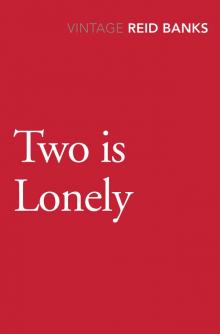 Two Is Lonely
Two Is Lonely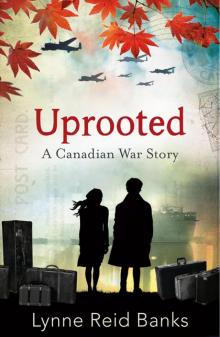 Uprooted - a Canadian War Story
Uprooted - a Canadian War Story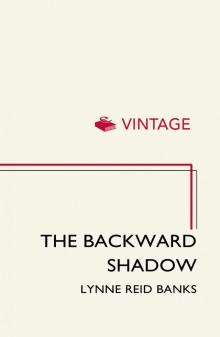 The Backward Shadow
The Backward Shadow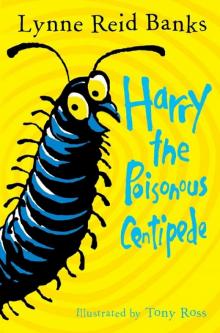 Harry the Poisonous Centipede: A Story to Make You Squirm
Harry the Poisonous Centipede: A Story to Make You Squirm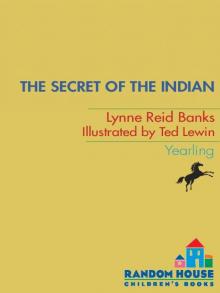 The Secret of the Indian (The Indian in the Cupboard)
The Secret of the Indian (The Indian in the Cupboard)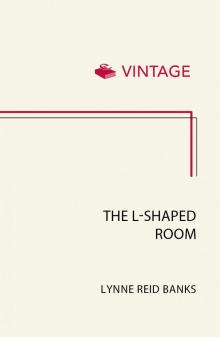 The L-Shaped Room
The L-Shaped Room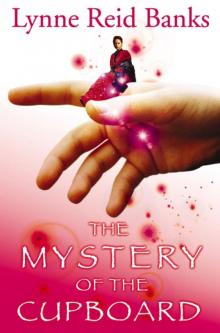 The Mystery of the Cupboard
The Mystery of the Cupboard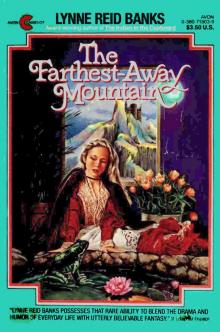 The Farthest-Away Mountain
The Farthest-Away Mountain Harry the Poisonous Centipede Goes to Sea
Harry the Poisonous Centipede Goes to Sea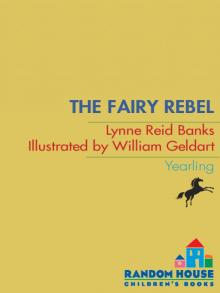 The Fairy Rebel
The Fairy Rebel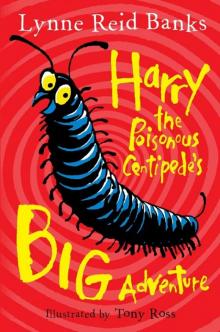 Harry the Poisonous Centipede's Big Adventure: Another Story to Make You Squirm
Harry the Poisonous Centipede's Big Adventure: Another Story to Make You Squirm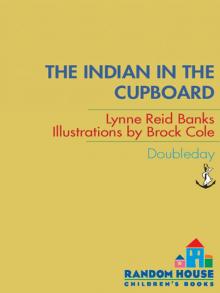 The Indian in the Cupboard
The Indian in the Cupboard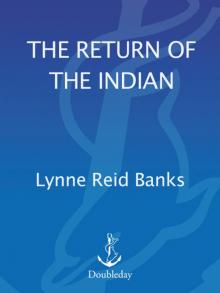 The Return of the Indian
The Return of the Indian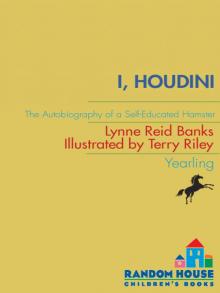 I, Houdini
I, Houdini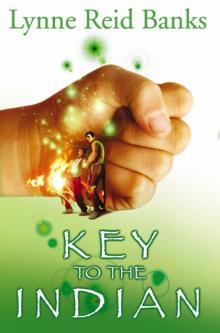 The Key to the Indian
The Key to the Indian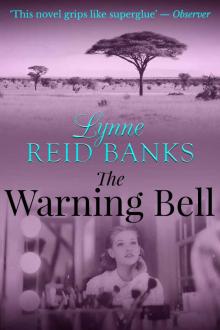 The Warning Bell
The Warning Bell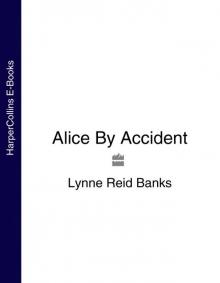 Alice by Accident
Alice by Accident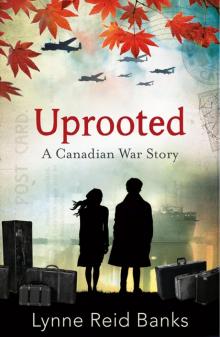 Uprooted
Uprooted Writing On the Wall
Writing On the Wall The Adventures of King Midas (Red Storybook)
The Adventures of King Midas (Red Storybook)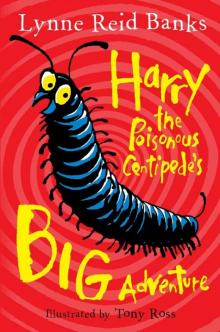 Harry the Poisonous Centipede's Big Adventure
Harry the Poisonous Centipede's Big Adventure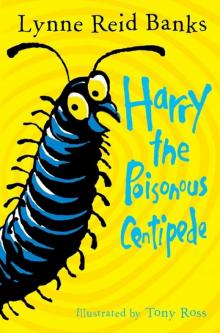 Harry the Poisonous Centipede
Harry the Poisonous Centipede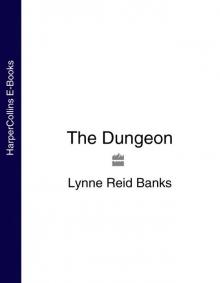 The Dungeon
The Dungeon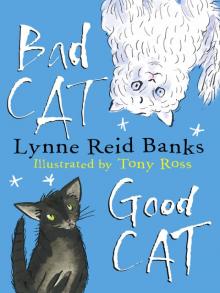 Bad Cat, Good Cat
Bad Cat, Good Cat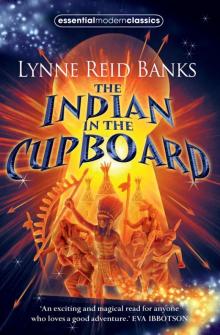 The Indian in the Cupboard (Essential Modern Classics, Book 1)
The Indian in the Cupboard (Essential Modern Classics, Book 1)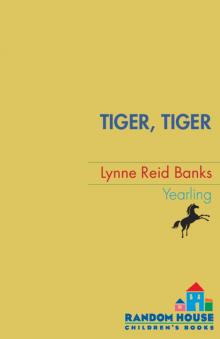 Tiger, Tiger
Tiger, Tiger